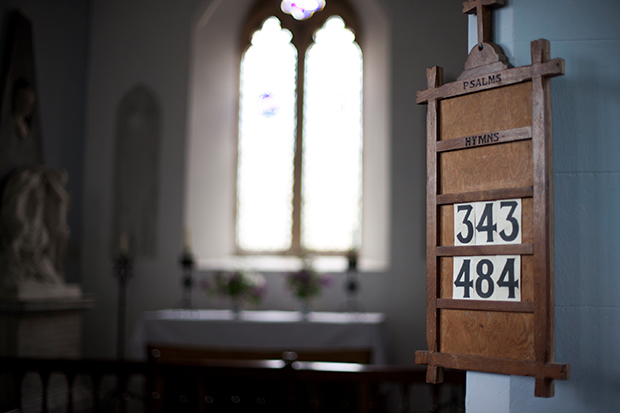On Saturday my boy had a mini-stroke at home, aged only 26. ‘You’ll have to give up smoking and do a spot of exercising now and again,’ I told him as the ambulance drove away. Smoking is his solace and consolation. ‘Out of the question,’ he said. On Sunday morning I went to church. ‘Your son ought to have taken the option of going to hospital,’ said the vicar before the service. Before becoming a vicar, she was a medical missionary in Papua New Guinea for 40 years and one wonders at the mental adjustment required for dealing with the subtler barbarities of a pretty English village. ‘He’s going to the doctor first thing tomorrow morning. Or so he says,’ I told her.
The service was a special Songs of Praise celebration. Holidaymakers and dilettantes such as myself swelled the congregation to around 50-strong. I went with my mother, who is an active church member and only ever misses a service through illness. It was the third time I’ve been to St Michael’s this year, I think, and I was welcomed with an enthusiasm that surprised me.
We kicked off with Canon Michael Saward’s hymn ‘Christ Triumphant’. I knew it. It is a fine hymn to lubricate the larynx. Lifelong Anglican servant Canon Saward died in January, and we were enjoined to celebrate his life as we sang. After that we sat or knelt to pray. Led by the vicar, we asked God to grant us forgiveness ‘for our careless thoughts, for our thoughtless deeds, for our empty speech, for our false desires, for our hateful actions, and for our wastefulness.’ Because these things are all I seem capable of, and because empty speech, in my admittedly limited experience, is the hallmark of English conversation at its most civilised, I was unable to ask forgiveness with anything like sincerity and I sort of skated over the surface.
We then rose again to sing ‘How Great Thou Art’. After the gentle warm-up of ‘Christ Triumphant’, we really let go with this one. I know the words by heart. They melt it every time I sing it. It’s that soaring chorus: ‘Then sings my soul, my Saviour God to Thee’. It trips me up every time. Once again the old feeling of helplessness engendered by those words and that melody stole over me and I lifted my face and sang out hardly knowing where I was.
Across the aisle, and in the corresponding pew, was a man worshipping alone: late fifties, beard, khaki shorts, grey socks, polished shoes. He reminded me of a scoutmaster. But what a voice! It was a beautiful tenor. Swaying majestically to the hymn’s slow rhythm, he used it to fling out his soul. I’ve been in plenty of evangelical and charismatic churches in my time and I have witnessed religious exhibitionism of every variety. But there was no trace of it in this man’s demeanour. He just loved to sing. His spirit was with us rather than against us or flying a loop the loop about the church rafters. And what a bonus it was to have his large, true voice to shelter and lead us. On the other side of me was my mother. I looked to the front as I sang, but I was conscious that her ego, which in day-to-day life is almost invisible, diminishes in church to the point where her presence becomes indistinguishable from the church furniture.
Next we sang that old Charles Wesley classic ‘And Can It Be That I should Gain?’. At that stirring line ‘My chains fell off, my heart was free/ I rose, went forth and followed Thee’ I was possibly exceeding even the marvellous tenor in volume and passion. Then we sang ‘Stand Up, Stand Up for Jesus’, which made me want to tramp up and down the aisle, and then ‘Thine Be the Glory’, the chorus of which has popped spontaneously into my mind at strange or incongruous moments, like an auditory hallucination, all my life. Discerning that some of us were flagging by this time, the vicar said we should omit all but the first and last verses of ‘The Battle Hymn of the Republic’.
Returning home after the service, exalted by an hour of rollicking hymn-singing, I saw that my son was outside, meticulously polishing the roof his Jag. I went over to him. ‘How do you feel now?’ I said. ‘A bit shaky still,’ he said. ‘You’ve got to give up smoking, you know,’ I said, hating myself for rank hypocrisy. ‘Out of the question,’ he said, shortly. ‘What about vaping?’ I pleaded. My boy indicated that the conversation was closed, and for all time, by returning wordlessly to his polishing.
Got something to add? Join the discussion and comment below.
Get 10 issues for just $10
Subscribe to The Spectator Australia today for the next 10 magazine issues, plus full online access, for just $10.
Join Jeremy Clarke on the Spectator cruise. For details please visit new.spectator.co.uk/cruise
You might disagree with half of it, but you’ll enjoy reading all of it. Try your first month for free, then just $2 a week for the remainder of your first year.















Comments
Don't miss out
Join the conversation with other Spectator Australia readers. Subscribe to leave a comment.
SUBSCRIBEAlready a subscriber? Log in